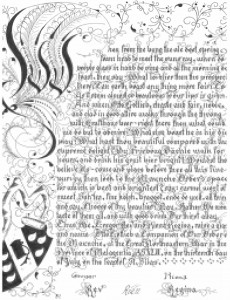By Aneleda Falconbridge with apologies to Walther von der Vogelweide.

_______________________
When from the bung the ale dost spring
foam head to meet the sun’s bright ray,
when people glass in hand do sing
and all the morning toast, they say –
What lovelier than the prospect there?
Can earth boast any thing more fair?
To Us it seems an almost heaven
so beauteous to Our lips that sparkling drought is given.
And when Otto Gotlieb, chaste and fair,
noble, and clad in good attire
walks through the throng with Krafthaus beer – right there
then what could We do but to admire?
What else boasts he in his display?
What hast thou beautiful and gay
compared with that supreme delight?
By Frieboug Bächle walk for hours, and drink his gruit bier bright!
Wouldst thou believe Us – come and place
before thee all this fine purvey
then look to the Maunche Order’s space
For which is best and brightest? say:
carmel wort of sweet Sah’tea, fine
Kolsh, braggot, ende de welt, all thine
And say, ‘Choose of thy beauties? Nay.
Rather We would taste of them all, and with good drink Our thirst allay.’
Thus We, Gregor Rex and Kiena Regina, raise a glass and name Otto Gotlieb a Companion of Our Order of the Maunche, at the Great Northeastern War in the Province of Malagentia, ASXLII, on the thirteenth of July on the feast of St. Silas.
________________________
This text was based on a translated German poem by Walther von der Vogelwiede, as the piece was from the same time period as Otto’s persona. Otto says about his own persona that he was “born in 13th century Freiburg to noble merchant parents. Count Egino II has been talking about raising taxes and making changes to our established rights. The people of Freiburg are restless.”
As he is from Friebourg, I tried to include some things about the city – like the Freiburg Bächle – small water-filled runnels which wend through the old city. They are ancient.
I also included specific brews he has made which are German or period, which discuss his art.
When From The Sod The Flow’rets Spring
And smile to meet the sun’s bright ray,
When birds their sweetest carols sing
In all them morning pride of May,
What lovelier than the prospect there?
Can earth boast any thing more fair?
To me it seems an almost heaven,
So beauteous to my eyes that vision bright is given.
But when a lady, chaste and fair,
Noble, and clad in rich attire,
Walks through the throng with gracious air,
As sun that bids the stars retire,–
Then, where are all thy boastings, May?
What hast thou beautiful and gay
Compared with that supreme delight?
We leave thy loveliest flowers, and watch that lady bright.
Wouldst thou believe me,– come and place
Before thee all this pride of May;
Then look but on my lady’s face,
And, which is best and brightest? say:
For me, how soon (if choice were mine)
This would I take, and that resign!
And say, “Though sweet thy beauties, May!
I’d rather forfeit all than lose my lady gay.”
(In German)
So die bluomen us dem grase dringent,
Sam si lachen gegen den spilnden sunnen
In einem meien an dem morgen fruo,
Und die kleinen vogellin wol singent
In ir besten wise die si kunnen,
Wunne kan sich da gelichen zuo?

